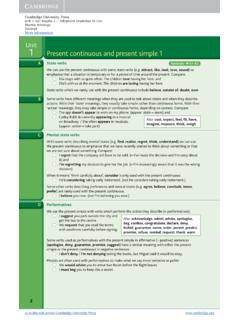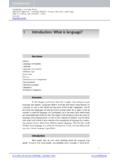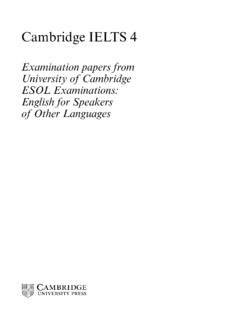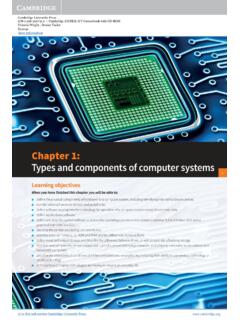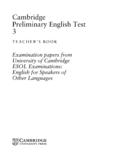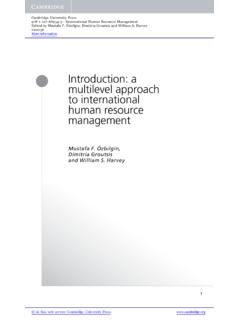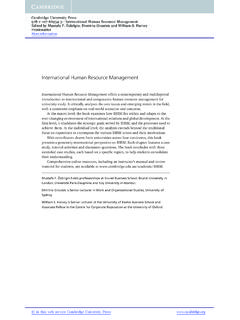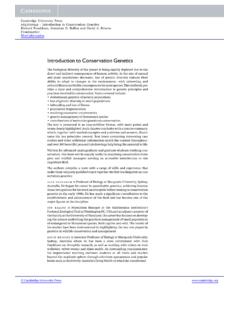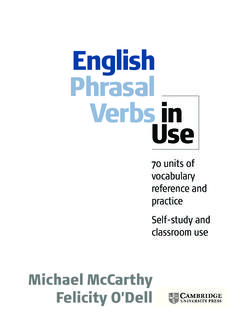Transcription of Nicomachean Ethics - Cambridge University Press
1 Cambridge University Press978-1-107-03960-5 Aristotle: Nicomachean EthicsAristotle , Edited and translated by Roger Crisp FrontmatterMore in this web service Cambridge University PressCAMBRIDGE TEXTS IN THEHISTORY OF PHILOSOPHYARISTOTLEN icomachean EthicsCambridge University Press978-1-107-03960-5 Aristotle: Nicomachean EthicsAristotle , Edited and translated by Roger Crisp FrontmatterMore in this web service Cambridge University PressCAMBRIDGE TEXTS IN THEHISTORY OF PHILOSOPHYS eries editorsKARL AMERIKSP rofessor of Philosophy, University of Notre DameDESMOND M. CLARKEE meritus Professor of Philosophy, University College CorkThe main objective of Cambridge Texts in the History of Philosophy is to expand therange, variety and quality of texts in the history of philosophy which are available inEnglish.
2 The series includes texts by familiar names (such as Descartes and Kant) and alsoby less well-known authors. Wherever possible, texts are published in complete andunabridged form, and translations are specially commissioned for the series. Each volumecontains a critical introduction together with a guide to further reading and any necessaryglossaries and textual apparatus. The volumes are designed for student use at under-graduate and postgraduate level, and will be of interest not only to students of philosophybut also to a wider audience of readers in the history of science, the history of theology andthe history of a list of titles published in the series, please see end of University Press978-1-107-03960-5 Aristotle: Nicomachean EthicsAristotle , Edited and translated by Roger Crisp FrontmatterMore in this web service Cambridge University PressARISTOTLEN icomachean Ethicstranslated and edited byROGER CRISPSt Anne s College, OxfordRevised EditionCambridge University Press978-1-107-03960-5 Aristotle.
3 Nicomachean EthicsAristotle , Edited and translated by Roger Crisp FrontmatterMore in this web service Cambridge University PressUniversity Printing House, Cambridgecb28bs, United KingdomCambridge University Press is part of the University of furthers the University s mission by disseminating knowledge in the pursuit ofeducation, learning and research at the highest international levels of on this title: Cambridge University Press2000 2014 This publication is in copyright. Subject to statutory exceptionand to the provisions of relevant collective licensing agreements,no reproduction of any part may take place without the writtenpermission of Cambridge University published2000 Revised editionfirst published2014A catalogue record for this publication is available from the British LibraryLibrary of Congress Cataloguing in Publication dataAristotle.
4 [ Nicomachean Ethics . English] Nicomachean Ethics / Aristotle ; translated and edited by Roger Crisp, St Anne s College,Oxford. Revised ( Cambridge texts in the history of philosophy)isbn978-1-107-61223-51. Crisp, Roger,1961- dc232014013623isbn978-1-107-03960-5 Hardbackisbn978-1-107-61223-5 PaperbackCambridge University Press has no responsibility for the persistence or accuracy ofurls for external or third-party internet websites referred to in this publication,and does not guarantee that any content on such websites is, or will remain,accurate or in the United States of America by Sheridan Books, Inc., 2017 Cambridge University Press978-1-107-03960-5 Aristotle: Nicomachean EthicsAristotle , Edited and translated by Roger Crisp FrontmatterMore in this web service Cambridge University PressContentsAcknowledgementspageviIntro ductionviiChronologyxxxviFurther readingxxxviiiNote on the textxliNicomachean Ethics1 Book I3 Book II23 Book III37 Book IV59 Book V79 Book VI101 Book VII117 Book VIII141 Book IX162 Book X181 Glossary202 Index206vCambridge University Press978-1-107-03960-5 Aristotle.
5 Nicomachean EthicsAristotle , Edited and translated by Roger Crisp FrontmatterMore in this web service Cambridge University PressAcknowledgementsSeveral friends and colleagues have offered helpful advice and comments onparts of this translation. I wish here to thank the following: ElizabethAshford, Pedro Fortuny Ayuso, Lesley Brown, Pierre Destr e, TroelsEngberg-Pedersen, the late R. M. Hare, Bryn Harris, RosalindHursthouse, Christopher Kirwan, Christopher Megone, Daniel Robinson,Dominic Scott, Robert Wardy, and David Wiggins. I am greatly indebted tothe late Heda Segvic for suggesting a number of revisions in an acute reviewof thefirst edition (2002). Errors that remain are, of course,my own responsibility, and I would be grateful to be informed of them.
6 I amobliged also to Will Allen for help with literary references, to DesmondClarke for his encouragement and for his comments on the penultimatedraft of the translation, to Hilary Gaskin for her wise advice and patience,and to Bryn Harris for assistance in adding the Bekker line numbers for thesecond edition. First drafts were completed during a British AcademyPostdoctoral Research Fellowship held at University College, Oxford,1989-91. I am grateful to both institutions for their University Press978-1-107-03960-5 Aristotle: Nicomachean EthicsAristotle , Edited and translated by Roger Crisp FrontmatterMore in this web service Cambridge University PressIntroduction All human beings, by their nature, desire understanding.
7 Thefirstsentence of Aristotle sMetaphysicsis paradigmatically true of its sought to understand, and to help others to understand, logic, math-ematics, the nature of reality, physics, knowledge, the mind, language,biology, physiology, astronomy, time, theology, literature, rhetoric, thenature of human happiness, and much else. A full translation of hisworks of which only onefifth has survived runs to over one-and-a-half million was born in Stagira, in Macedonia (now northern Greece), in384bce. His father was a doctor, and this may partly explain his fondnessfor medical analogies in theEthics(see, ,1138b). Aristotle arrived inAthens in367, and spent the next twenty years there as a member ofPlato s Academy.
8 Plato died in347, and Aristotle left Athens for thirteenyears, during some of which he was tutor to Alexander. In334hefounded the Lyceum in Athens, remaining there till shortly before hisdeath Ethics (NE, or the Ethics ) is almost certainly theproduct of Aristotle s developed intellect, consisting in a revision ofaround330of his earlierEudemian Ethics (though some scholars believetheEudemianto be later, and indeed better).NEcontains ten books, ofwhich three booksv vii are shared with theEudemian Ethics ,andusually thought to belong to that earlier work. Another work on ethicstraditionally ascribed to Aristotle theMagna Moralia is now gen-erally considered not to have been written by him, but perhaps by ,theEthicswas not written forviiCambridge University Press978-1-107-03960-5 Aristotle: Nicomachean EthicsAristotle , Edited and translated by Roger Crisp FrontmatterMore in this web service Cambridge University Presspublication, consisting rather in a full set of lecture notes, on whichAristotle would doubtless have the ethical work of Aristotle s which dominated later had a great influence on the schools of thought that developed soonafter his death, Stoicism and Epicureanism in particular.
9 It was thesubject of scholarly commentaries throughout the early middle ages,and was widely read in the West from the twelfth century. As JonathanBarnes has put it, An account of Aristotle s intellectual afterlife would belittle less than a history of European thought. 1 His influence on contem-porary moral philosophy remains significant, and I shall say a little moreabout this audience for Aristotle s lectures would have consisted primarily ofyoung men, though not so young that their attendance would have beenfruitless (see, , ,1095a). Most of them would have been of less thanhumble origin, and might have hoped to make their way in a career inpublic life. They were people who could have made a difference, andAristotle is insistent that his lectures are practical in intent ( , ,1103b).
10 It is sometimes said that Aristotle s ethical views are mereAthenian common sense dressed in philosophical garb. Certainly, someof Aristotle s views, as one would expect, are unreflectively adopted fromthe culture in which he lived, and at times, as in his discussion of great-ness of soul , he can seem the outsider concerned to demonstratethat he is more establishment than the establishment. But Aristotle, likeSocrates and Plato before him, believed that certain aspects of the mor-ality of Athens were deeply mistaken, and sought to persuade his audienceof that, and to live their lives , when Plato was twenty-nine. Most of whatwe know of Socrates comes from Plato s dialogues. A central Socratictenet was that moral virtue consists in knowledge, so that one who actswrongly or viciously acts from linked it closely with virtue and knowledge.

